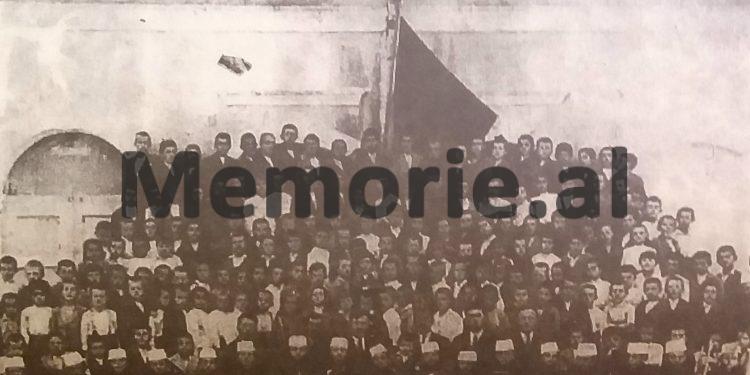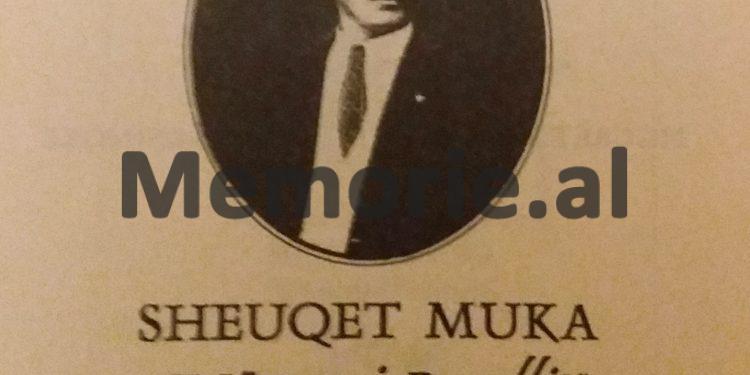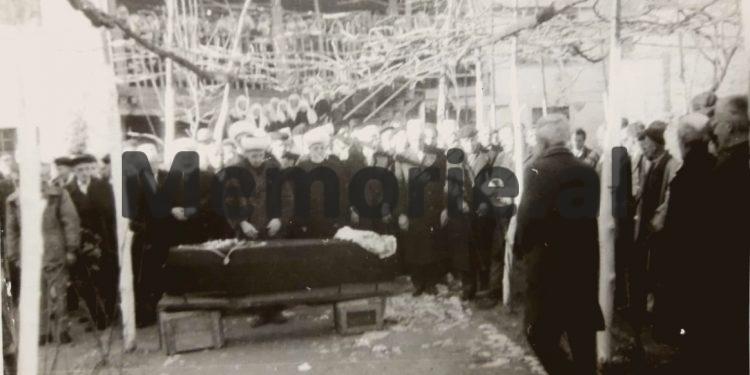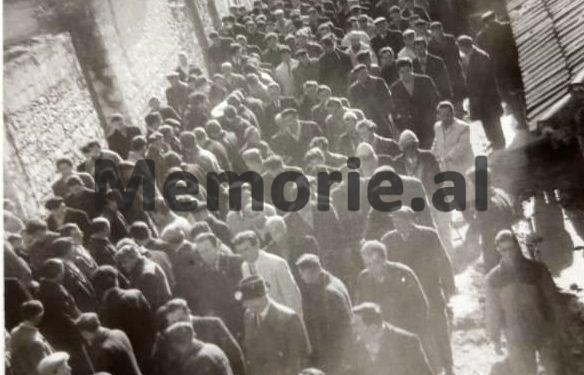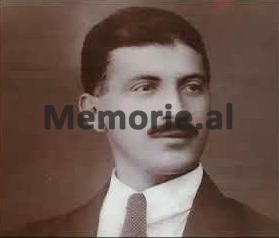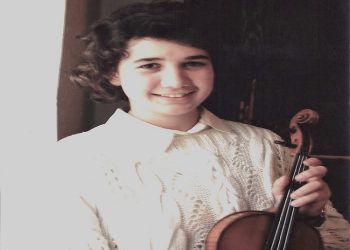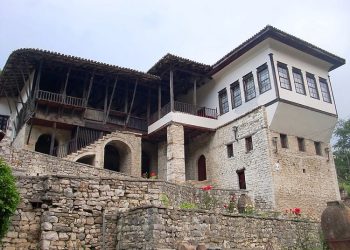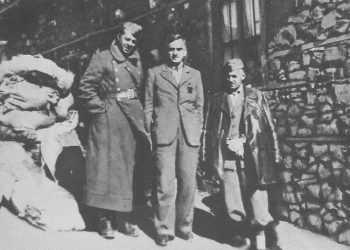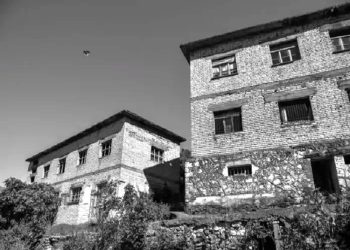
Islam Dizdari
Memorie.al/ “Man from the cradle until he overshadows his memories of this world, he needs to learn and learn and no matter how far the place of knowledge is, he must go there to take it and acquire it… rise up and know that to be, the stronger and richer we will have a nation and homeland, at the same time we will be happier. “
(From prison letters)
The life and activity of Sheuqet Muka is a shining example, which clearly proves to us what a person can achieve when he is committed to the duty to serve the homeland and the high ideals of the development and progress of his people. The personality of this idealist becomes more complete, you are acquainted with his life full of complications and political deprivation, full of turmoil and persecution, imprisonment and internment, which were not shared until the last moments.
Anyone can think of how not to break, how not to bend, how not to be defeated! No, on the contrary, even in the most difficult moments, he found strength and became more conscious, more convinced, more powerful in the fight for his national ideals, for his democratic aspirations, for his solidarity in the field of national education. His freedom-loving spirit, his iron will, strong character, intellectual interests, clear orientation in the most difficult moments that the country was going through and our education, were the motivations that motivated Sheuqet Muka in his unceasing struggle for the benefit of the school, of teaching and educating the younger generations. He is the typical example of the “TEACHER OF THE PEOPLE”.
Giving an eye to the educational activity of Sheuqet Muka, one can outline the help of this honorable man in several fields of national education.
- Teacher and school director in Shkodra and Tirana.
- Director and educator of orphans in the Vorfnore Shelter of Tirana.
- Connoisseur of the most advanced world pedagogical thought and reformer of education in Albania, author of textbooks.
- Initiator of the organization of teachers’ activity, promoter of protests in defense of their interests.
- Active man, self-seeking to the end, to overcome the difficulties of time and to help others.
He started his educational activity in 1910 in Mejtep “Molla Medos”, where he organized a class with the students of this mejtep, to give the first teaching knowledge. He would then complete this class as soon as the Parruca school was opened under the direction of Haxhi Hafiz Abaz Golem. At Parruca School, his educational career begins in the full sense of the word. Here, of together with the old teachers: Rrustem Lopçi, Musa Tabaku, Jonuz Çajku, Jusuf Puka, Ragip Hoxha, Ismail Anamali, etc., will be guided all their lives: devotion to the homeland of the people, devotion to the duty of the teacher. Traces of this activity are clearly visible in many carefully preserved documents from the family and archives. The Wig School was opened in 1913, by the Education Council set up at the City Hall along with two other schools: the ‘People’s School’ and the ‘Russian School’. ‘Parruca School’ at the beginning of its activity, was semi-secondary. The documentation was kept in Turkish, but the lessons were given in Albanian, with all Albanian teachers and Albanian students.
We have talked about this problem other times, but we are emphasizing that Sheuqet Muka, responding to the criticism of a specialist, wrote: “… It is to thank our teachers very much, why do they teach the seeds? in our language, but in order not to forget the explanation, they write you in Turkish, in the form of a note (alphabet, our note). I also say this, which I have seen with my own eyes in trials that take place after three months, the connections of writing are not ignored, but the thoughts are ignored, whatever he wanted with anything. Well, it is not good for me to say without looking at it that we have mejtepet (schools), we have them like those of Asia, because in the schools of Asia we do not speak Albanian. The modern Albanian that they write and learn today in Dar-ur-irfane (the house of culture, the first name of the school of Parruca. Our note), is not sung there day by day. It is not fair, then, for a scholar to say that “our children are suckling thinner than us in Asian meqtebe.”
This idea is best confirmed by the notes he left on the teaching of biology in this school, entitled “Botany-Initial and general lessons”. These notes are written in the form of a summary lecture, in Albanian. For many scientific concepts, until then unused in the Albanian language as scientific or school terminology, Sheuqet Muka uses Turkish or Arabic terminology. Meaningful in this regard is also a “Primer for the Little One” dated 1916-1934 (manuscript), which has an interesting note, was written for the third time. The primer has 28 pages of large format (A4) with 30 lessons in Albanian language, written in the unified alphabet of the Congress of the Monastery, with all the characters of handwriting and print, small and large. In the ‘School of Parruca’, he will work for 20 years, from April 23, 1913 until he will be appointed director of the Model School “Hoxha Tahsin” in Tirana, in 1933. From the beginning of work in this school will to be the right hand of the director, Haxhi Hafiz Abaz Golem, and will be distinguished not only as a teacher, but also as an organizer of many educational and cultural activities with students. In all reports he will deserve the best praise and congratulations from the principal and inspectors who visited the school.
Every friend, every civil and military authority who visited the school, would come in and meet with the class and the eminent teacher Sheuqet Muka. It is no coincidence that his class was visited in 1918 by the Consul General, Kral, Mati Logoreci, Luigj Gurakuqi, and many other personalities later. Thus, year after year, until 1925, when he will be appointed Director of this honored school not only in Shkodra, but throughout Albania. This school was distinguished for the order and quality in the formation of students, for a high pedagogical level, for the basis of didactic materials, primary school equipped with modern tools for teaching natural sciences, history, geography, mathematics and geometry, etc. . Suffice it to say that in this school with the initiative of Sheuqet Muka, the library for students was established in 1922. Also, with a dedication to be admired, Sheuqet Muka, with the help of teachers: Ragip Gjylbegaj, Mehmet Gjyli and Shuajb Domnori, founded the wind instrument orchestra with the school students (musical fanfare).
Tools were ordered and purchased in Czechoslovakia, each student had three costumes, two official and one national. This orchestra performed during the days of national and religious festivals in Shkodra, Tirana, Ulcinj and Podgorica. In the report that Sheuqet Muka writes about the visit to Ulcinj, he says, among other things: “Everyone had come out to accompany us, and they did not hold back the tears of joy.” While a newspaper of Podgorica, commenting on the concert given by students in this city, wrote “… that he made the effect of a bomb”. And let us not forget that they were students of primary school, in the ’30s.
Such ventures were incredibly bold and today seem somewhat utopian to us. This would be enough to give a little dedication and willingness to work of Sheuqet Muka. The teachers of this school will use the most advanced teaching methods for the time. The rich archive in the school museum proves this quite clearly. We are bringing only two examples from “New teaching methods and design lessons” and a student test. The drafts and other writings will be based on daily observations from life, and after this is done, the way of presenting the development of the topic will be thought out and planned. Sheuqet Muka writes about this: “All books, articles, letters, articles, contracts are full of words. When we want to build a new building as if I need stone, lime, planks, nails, etc., I also need words, whenever I need to write a book, paper and stick. Can a building be thrown in a place with a stone, fell, lime and plank? Of course not. The building that is going to be new, the plan will be made first… and whenever we want to write a letter or stop, we will first prepare its plan, we have to think about things before we write them and then we take thoughts and line them up in a connected way”.
After the presentation of the way of preparation for drafting, some examples that have these methodological developments continue: The topic of the drafting “Work is a treasure” is defined, a short story is given, its plan in three points, messages and questions and then, based on them, the drafting is developed. full. In a notebook that lasted 15.6.1923 (last topic) are given ten developed topics, which are in the form of stories, descriptions, letters, prose and poetry. While testing students for the exam is very interesting. Historical knowledge is tested by asking students to submit it in literary form, according to some of the requirements set out earlier. These requirements are not a simple reproduction of historical facts, but the student, no matter how he presents them, analyzes them, gives the reasons and presents his views. Then a prayer is asked and a telegram is given below, which the student must shorten by removing the words so that they do not spoil its meaning. Do you think that we are at the beginning of national education? Even today such requests would be considered as advanced and their realization would be a pedagogical innovation. At the beginning of the school year 1933, Sheuqet Muka was appointed Director of the Model School “Hoxha Tahsini” of Tirana44 in which he works at all, from 14.09.1933 until 4.10. 1933, because he was appointed Director of the “Vorfnore Shelter” of Tirana.
On this occasion, the Deputy Prefect of Shkodra, Etem Toto, issues a certificate of courtesy to Sheuqet Muka, where it is written, among other things: “… This prefecture is called upon to show to its Lord the glory and the deepest satisfaction for zeal and energy qi has shown during the period of service in national education and for his good behavior for how long qi was found between the service here in Shkodra ”. Now begins an intensive work for Sheuqet Muka, who even in completely different conditions and circumstances finds the strength and creates the opportunity to transform this orphanage into a modern educational institution. Starting from sound pedagogical principles, he merges into a deep love and care for orphaned children, with high demands for order and discipline, for cleanliness and systematic work with students, combines learning correctly with daily life in the orphanage school, is interested to open workshops for both boys and girls, organizes the orchestra with various musical instruments, develops various sports and cultural activities. Life at Vorfnore Shelter becomes enjoyable and rewarding.
Departments of carpentry, tailoring, knitting, weaving, embroidery, shoemaking, etc., plots of land in the suburbs of Tirana make children always in a constant activity, live, learn, work, make most of the expenses of themselves, nourished and clothed by their work and sweat. This work started with such pedagogical clarity will be interrupted after six years of fascist occupation, when he will be dismissed and interned in Zvërnec of Narta and later in Elbasan. This is where his educational career ends and he then continues in completely different circumstances, in the school of communist prisons, a problem which he will address with deep touching feelings Mr. Sheuqet Kraja, co-sufferer and student of Sheuqet Muka.
Pedagogical views
Sheuqet Muka started the educational activity without a proper pedagogical preparation. He had attended only one Turkish gymnasium, without even completing it completely, but nevertheless he had received the basic foundations of cultural and scientific formation, he had received the impetus to study and form systematically, without ever letting go of the book… He will come with an extraordinary will to grow and become a personality of national culture and education. He attends courses, since the beginning of his career he creates a rich library with books in different languages, with magazines and newspapers, he studies constantly, writes and publishes articles, studies and textbooks, he is never satisfied with the knowledge he has gained, is always on the lookout for work. For this inspector Gaspër Mikeli in a Letter of good service would write on 11.9.1924 “… although he does not have a normal course or studies, with the living practice and the continuation of the fourteen years he has as a teacher and with studies and studies qi ban day by day he has equipped the world with knowledge and with the qualities that are required of him, he must have a real teacher, so that the incomparable zeal that shows in the performance of the task and the ability that he possesses especially for the development of the lesson, prove that this is no different from the capable normalist teachers of Shkodra, therefore it was deemed appropriate to give this letter of service to the teacher in question as a reward for the effort in his activity that you do with energy and always with full power for to fulfill the sacred purpose of his duty as a teacher, he tried for the first time to give proper development to published education ”.
Sheuqet Muka talking about the role of the normal school also defines the role and duties of the teacher. “From the normal school,” he writes, “tomorrow we will have good teachers, with the right ability, with a clear conscience, with a simple national ideal, yes, only from it we will have teachers with perfect skills who have the knowledge best to perform their sacred duty, who have nourished the new Albanian generation with the most beautiful and noblest feelings, who have elevated the career of a teacher who today does not like a little horse. ” Not only did he acquire these qualities, but he also applied them precisely in his teaching activity, and even more so he knew how to organize the work in such a way that the teachers of the Parruca school were at the forefront of the demands of the development of national education. In his work he managed to have high demands on himself and his colleagues, which created unity of thought and encouragement for daily creative activities with students. In the annual reports there is a clear pedagogical concept in the treatment of teachers, they are collaborators in achieving the goals and tasks that were set before the school, so he aimed to see in everyone the good sides of the work and to develop this definition of the qualities of school teachers, the evaluation of their work tends only from the good sides.
It is interesting to note that in the beginning he evaluates the work of the best down to the last teacher for whom he finds something to point out for good, and in the end, he has something accomplished, which he intends to develop. In no case does it report flaws. Apparently, he has fought them in individual consultations, while in front of the teaching body he does not say any bad words about anyone. Ratings are escalating. This is an interesting phenomenon of this very urgent director. Maintains and develops the personality and dignity of each teacher. The work of the teachers was related to that of the students. He demanded that students be role models in teaching and education. He would express these ideas quite clearly throughout his brilliant educational career, driven by a paternal care, by a deep love for the sons of the people, by rigor in requirements. With his work he made the Parruca School deepen the traditions created by the predecessor Haxhi Hafiz Abaz Golemi.
By influencing students, the school also influenced families, which gradually became more aware of its usefulness and role. And this made the circle of families, from which the school attracted students, to be more interested in her work and to have higher and higher demands on teachers. This tradition is preserved even today in this school which is one of the best in Shkodra. He expresses the pedagogical views on the role of students very clearly since 1920 in a “manual” entitled “Student Mirror”. Through him, the author thinks that the student “me has always kept me in progress, my civilization has become an example and thus has been able to emerge victorious in the struggle of life njeriut human life is a description of war from the day of Lem until to love. He instructs the students to learn the Albanian language, which is the most technical weapon today, through it they will face and wait for any obstacle he has to dare to appear in the war and who does not want to harm himself uses matters at work that in time all his power so no doubt the victory would have been his. “Life is a field of work, a field of production and a source of profit.” In this “Student Overview” the most important chapter is “Discipline is the head of all things”. Here Sheuqet Muka has presented many interesting pedagogical and educational views. We are mentioning some of them:
– We must always correct our shortcomings.
– Every passing year leaves in our consciousness a deposit of properties that should make us more and more wise.
– Woe to him who does not make a profit from the proof of his life!
– An undisciplined student is an element of bullying.
-Only a people that honors its laws is a strong people.
-Man has duties towards himself, family, homeland, humanity and towards faith.
An interesting paragraph is one that talks about the differences between moral conscience and laws, concluding that conscience and law should not be in conflict, so man in youth should be watered to perform the tasks that conscience and law command us. Below is a series of moral tips to bring to society the great ones with the position of with age, to friends, etc. In this regard, he gives the sentence: “Remember in any case that life would have been better for me, if people had been better, wiser, more generous, less full of pleasures, less united for superiority …”
Sheuqet Muka strictly applied these principles for the relations with the students and these requirements to the discipline and behavior of them in the Wig School and later in the Vorfnore Shelter. He established such bonds and relationships with the students that they remembered their teacher even in difficult days and remained friends for life. When he was interned in Italy, he received many letters from students: Ragip Bekteshi, Hysen Lohja, Ragip Gjylbegu, etc. Even as students grew and progressed in life, they kept in touch with their beloved teacher. In the family archive there are many such letters from Tahir Shkreli, Adem Bazhdari, and other students in Italian universities. There are many pictures with special students, which show close connections between the teacher and the student. Sheuqet Muka started from a principle of pedagogical importance in the field of education: “Theories are not enough, words are not enough, they must be put into practice, they must be applied precisely.” For this he writes “An unworkable theory, is it better to say without adding to the work, it will always surprise us and hinder us. “Today’s social life is more than a practice, it is our lively work.”
Starting from the conditions of our country and from the miserable condition of the schools and the education of the children of the people, where illiteracy and ignorance prevailed, he fights for a mass education for all children, for equality in education for all strata of the population, for equality between boys and girls and especially fights for the education, advancement and education of girls and women in our country. He starts from the idea “to equip the sons of Albanian with the wings of knowledge that are the most precious ornaments of this life.” He tries to enroll all the children in the neighborhood in school, he insists on enforcing the school obligation and for this he intervenes until the Ministry of Education. After 1925-26, the school obligation was implemented in the school of Parruca. In 1918 Sheuqet Muka started teaching in the first grade with 7 students, but with his work he managed to increase their number and the class had 32 people. This was an important achievement for the time. Sheuqet Muka raises some problems regarding the massification of education:
– The conscience of the teachers at work, their zeal and the idea that they nurtured for the Albanian nation encourages them to never get tired of a thread, without getting bored at all of their efforts, to be able to carry out the required school curriculum.
– Many parents do not know how to appreciate school lessons, because they do not know them and are completely foreign to school curricula “… they look at the lessons given in the classroom with a bad eye and even the many subjects of different lessons are despised of them.
They know the great weakness of learning to look like nothing and how to pass the time. The history of Dheshkronja as dry tales, Physics as a knowledge that is mixed in the deep works of the River…”. Therefore, Sheuqet Muka asks teachers to approach their parents and patiently explain to them the usefulness of the school and the value of the lessons that take place there. He himself was the first to set an example in this area. He was a staunch opponent of misconceptions about school and teaching, persistently fighting any backward thought that was fed to her by ignorant minds. He justifies the situation as follows… Innocent is the desert (people). He does not see what he needs, he needs someone to take him by the hand to take him to where nature has not provided light for him. Those who have the fate of the good are putting it around their necks
They do not advise them on the right path of progress, but they want to go about their lives in the dark like cattle, or worse than them.
Sheuqet Muka raises these problems before the Municipality, the Prefecture, the Members of Parliament and the Ministry of Education. Prepare a letter to Mr. Halit Rrojin, deputy of Shkodra, to send to the Prefect of that time, who had to intervene at the Ministry of Education, so as not to close three schools in Shkodra, whose teachers had to attend the Provisional Normal. It is to continue the fight for compulsory primary education: “Today the day has come to realize the sacred ideal that we have been feeding for so long. We do not understand why it is twisted from the path that should be followed. ” Criticizes the decision to close some state schools in the city, because on this occasion: “private private schools, which so far have had thorns in the side, will be left with a path that remains alive.” It is for the education and upbringing of girls through the school of knowledge. He has expressed the ideas for this problem so delicate for the time in many documents. In the greeting speech for the opening of the girls’ school in Shkodra, in 1917, Sheuqet Muka writes, among other things: their own, and when they have to become lords of spies and inns, to raise their own children to maintain their health, to teach them wise and obedient, in a word to be humble, to shake them in cradle tue was sung as a song that reminds us “… you grew up a son to the black of the enemy, you became a son, to confess the hail, you bafsh son, oh my lollipop, witness for your homeland”!
From the beginning, the author lays as a basic idea the mental and patriotic education of school girls, moral education according to the best traditions of our people, preserving their honor and that of their family, to be trained in handicrafts, in several different crafts. He emphasizes the idea that “we Albanians should receive from Europe, from the civilized peoples only the rays of civilization that they have in their crafts, crafts and trades and not their vices, why do we not need them.” Polymathizing with the magazine “Agimi” he emphasizes strongly that the progress of a woman is not achieved only by formal actions ““the goal is not achieved by revelation; the woman is not given the dagger she deserves and cannot perform the duty to the child as the first teacher. The issue of women is a random issue, and only when we go out, we remember, that no progress can be expected and we can live as much as can be expected from the wife of Mbishkodra that we have revealed. ” According to Sheuqet Muka in the conditions of the country, taking into account the psychology of the people and the time, the woman is in the initial stage of development and “nevojë needs like a man a healthy culture, which can be achieved through school. “This would be the means to see the Albanian woman in the scale of citizenship and progress, in the footsteps that belong to her, and always faithful, noble, generous, masterful worker, true teacher and truly civilized, and to achieve “These things are not hindered by the collection, because it can come out especially in childhood”.
Sheuqet Muka expresses the need for education of girls even more clearly in a letter in the form of an article, sent to the Minister of Education, Kristo Floqi, who without asking the local authorities had sent abroad for studies a number of students of all Catholic faith, excluding for no reason those of the Islamic faith. And Sheuqet Muka, indignant, says to his friend, the Minister: “Are we leaving that the Muslim graves were not found to send them to foreign schools, but neither were the boys?” We are reminded that the Minister of Education is not Kristo Floqi that we introduce here in Shkodra with free ideas, but another”! Sheuqet Muka openly and resolutely defends the idea, but also the right and the need for education of the boys and girls of the Muslim community in Shkodra for education inside and outside the country. In this field he has been one of the initiators of the opening, operation and massification of schools in the Muslim neighborhoods of Shkodra, but also beyond in the villages. He fights both against the ignorance and disinterest of the family against prejudices and backward ideas, but also against the unjust actions and negligences of the competent state bodies.
He encourages and mobilizes teachers for good work, influences the public opinion, propagandizes for a mass education of the boys and girls of Shkodra. In fact, in the practical field he has many achievements, and this is best seen in the progress of Parruca school. Of great interest is also the work to fight the severe scourge of illiteracy or, as he writes, “the old illiteracy of illiteracy, which for so many years has afflicted my young men.” It aims “to instill in the hearts of the people the love for the mother tongue of the Albanian language and at the beginning of the year we had the doors, the state schools will be useless and full of Albanian birds.” 63 And the results are immediately visible. From 40 students in the first year, their number reached 100 and more, creating the first two classes with illiterates and a second class with more advanced boys. Teaching took place four days a week in the main subjects: reading, writing, drawing, counting. He is not satisfied with the goals of primary education, but aims higher, towards high school and high school. To achieve this, he is the initiator of the opening of the State Gymnasium in Shkodra. He fights for a national gymnasium, in the Albanian language, opposes Gurakuqi’s idea that, due to the lack of teachers and textbooks, the gymnasium be opened in the German language with Austrian teachers.
At this time, he is one of the strictest opponents of the opening of the Provisional Normal in Shkodra, which would not only weaken the full Normal of Elbasan, but also intrigued the opening of the gymnasium itself. At this time, he wrote a series of letters and petitions addressed to Rexhep Mitrovica, Mustafa Kruja, Maliq Bushati, Lumo Skëndos, Halit Rroji, etc., personalities of the time. He started from the idea of a secular school, outside the influence of the clergy, where neither the priests nor the imams interfered. In many documents, archives and family, Sheuqet Muka stated that: “Shkodra has lagged behind, it needs a high school, i.e. for an official national gymnasium with very good professors …, so that the child has a place to attend high school so that the new hope of your homeland does not fall without leaving it without a culture that it needs”. He also states: “To be honest, the private gymnasium of Freten does not respond to the common need of the country, because the people do not want children to be educated by the clergy, they prefer to wash their children without lessons. The clergy remain the clergy. In the Fret school there are religious figures and objects in the classrooms, which are not removed and the students of the Muslim faith do not feel free and at ease in those environments. So, of course, the need to open an official national gymnasium arises, why else would Muslims be required to seek a gymnasium in the Vedas, so the sacred ideal of a common education could not be realized. ”
Sheuqet Muka, organizer of national education
On May 7, 1922, the Minister of Education, Rexhep Mitrovica, sent him the announcement with the “program of the Education Congress, which will be held from the beginning of July. In order to facilitate your work, we are better to send you a copy of the analytical program and laws and regulations where you can get an opinion on the shortcomings of the reforms that are needed “. Along with the invitation, the congressional circular with the program for the issues to be discussed is sent. Sheuqet Muka is a prominent activist of the Congress and not only that, but he will take all his thoughts and decisions very seriously and will implement them in the classroom and school. He will be one of the most active teachers for the implementation of the world’s most advanced pedagogical thought. Strives for an intuitive, concrete and practical learning. Applies the methods of Decroll and John Dewey’s work school. For her education and methods, she is a follower of Pestalozzi, the father of the poor. And he would do so with a special dedication throughout his years of work at the Vorfnore Shelter. He aimed to increase the trust of orphans in people and especially in the educators and teachers of Vorfnore Shelter, he worked by always being close to them, so that they see in his person an educator who stood by them, who lived with them, who helped and encouraged them to enter life as free and able citizens to face the difficulties of life with honest work and the sweat of their brow.
The children of the Vorfnore Shelter were also diligent students, equipped with knowledge and culture, but also with life and professional skills by working and learning. This was a rich experience, but which unfortunately has been denied and forgotten for certain propaganda purposes. Sheuqet Muka will present his pedagogical thoughts in a series of textbooks, didactic materials, which unfortunately have remained in manuscript, in many studies and articles, many letters and documents that are fortunately preserved and may be published in the future. Sheuqet Muka, in every circumstance, has closely linked the problems of school and learning with education, with the fates of the people and the homeland, he was always in search and search, he did not devote himself to the study of teaching until the last moments of his life, but the theory he did not see as something dead, as a decorative relic, but aimed and propagated to get into action, in daily work, in life, in school, in teaching. He remains a model teacher for us./Memorie.al




